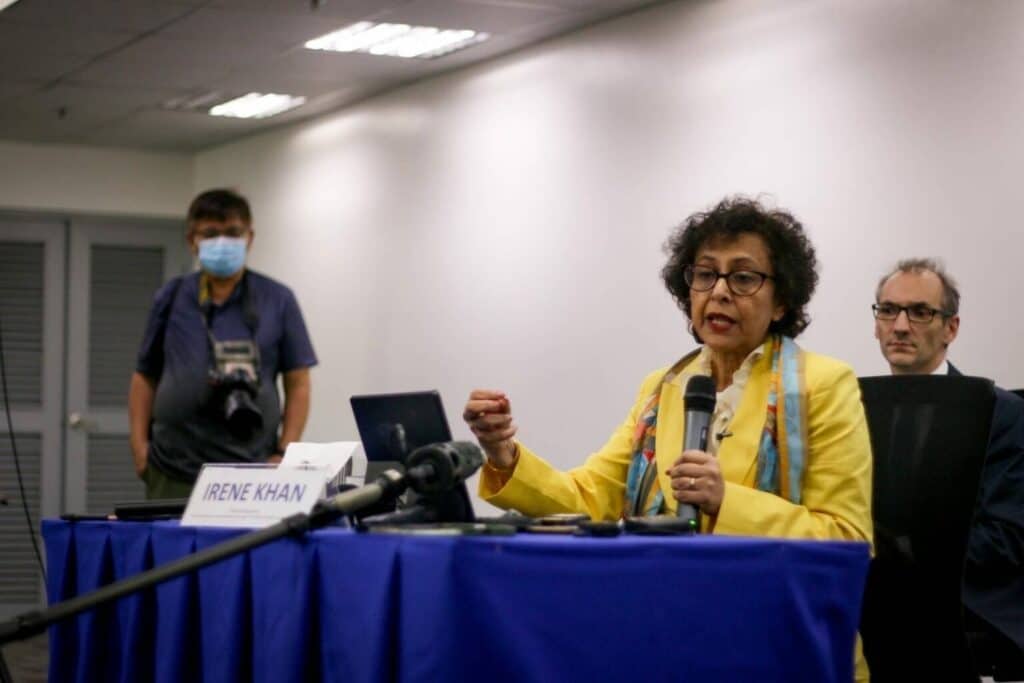
MANILA (2 February 2024) – Threats, vilification and violence against journalists and human rights defenders in the Philippines were particularly high during the previous Administration, but intimidation of critical voices has continued under the new government, a UN expert said today.
“The tone of the new Administration, coupled with its decision to open peace talks with insurgents and a renewed engagement with the international community, are positive signals, but addressing the serious and deep-seated human rights issues will require more fundamental and sustained reforms,” said Irene Khan, the UN Special Rapporteur on freedom of opinion and expression, in a statement at the end of a 10-day visit to the country.
Khan noted that many individuals critical of state policies, including, human rights defenders social justice advocates, journalists, students, trade unionists and others continued to be unfairly branded as supporters, recruiters or members of the Communist Party of the Philippines-New People’s Army (CPP-NPA), resulting in increased human rights risks.
“In many cases, vilification has been followed by threats, unlawful surveillance, attacks or even unlawful killings,” she said. “It intimidates and chills freedom of expression and suppresses legitimate activism, journalism or criticism.”
The UN expert urged authorities to publicly denounce so-called “red-tagging” practices and hold officials accountable for any violations. She said the counter-terrorism task force (NTF-ELCAC) – set up by the previous Government – should be abolished, allowing for more inclusive peacebuilding platforms involving women peacemakers and communities, as a genuine “whole of nation” approach to peace.
The Special Rapporteur stressed that the Philippines remains one of the most dangerous countries in the world for journalists. According to official UNESCO figures, 117 journalists were killed in the country in the last 30 years, of which 81 cases remain unsolved.
“The killing of journalists is the most egregious form of censorship,” Khan said. “Although some measures have been taken, the continued failure of the authorities to speed up the legal proceedings is a blow to the fight against impunity and to the families’ quest for justice,” she said.
“The results of the Inter-Agency Committee on extra-legal killings, enforced disappearances, torture and other serious violations (AO35 Mechanism) to investigate unresolved cases of political violence are clearly insufficient,” the expert said. She advised the Government to consider establishing a dedicated Special Prosecutor for crimes against journalists and human rights defenders.
Khan also raised concerns about the legal framework affecting freedom of expression, which she considers poses risks for the safety of journalists and human rights defenders.
The Special Rapporteur deplored that the Anti-Terrorism Act 2020 contains an overly broad and vague definition of terrorism, which leaves it open to abuse. She also raised concerns that the Cybercrime Prevention Act and the Penal Code contain provisions that criminalise libel. She called for the adoption of the Human Rights Defenders law, which is currently before the House of Representatives.
Khan met with young pre-trial detainees Mariel Domequil, Alexander Philip Abinguna and Frenchie Mae Cumpio at the Tacloban prison during her visit. “All three have been languishing in prison for four years, awaiting the resolution of their cases for non-bailable terrorism-related offences,” she said.
“As justice delayed is justice denied, I urge relevant authorities to either review the cases and dismiss the charges, or at a minimum expedite the trials with full due process,” the expert said.
The Special Rapporteur called on the Government to continue to give the UN an important and active role, helping to ensure a smooth transition and building trust with civil society, with a view to addressing impunity as a matter of urgency.
Ms. Irene Khan is the UN Special Rapporteur on freedom of opinion and expression. She was appointed UN Special Rapporteur on the promotion and protection of the right to freedom of opinion and expression on 17 July 2020. Ms Khan is the first woman to hold this position since the establishment of the mandate in 1993. She teaches at the Graduate Institute of International and Development Studies in Geneva, and was previously Secretary General of Amnesty International from 2001 to 2009 and head of the International Development Law Organization (IDLO) from 2012 to 2019.
The Special Rapporteurs are part of what is known as the Special Procedures of the Human Rights Council.
Special Procedures, the largest body of independent experts in the UN Human Rights system, is the general name of the Council’s independent fact-finding and monitoring mechanisms that address either specific country situations or thematic issues in all parts of the world. Special Procedures’ experts work on a voluntary basis; they are not UN staff and do not receive a salary for their work. They are independent from any government or organization and serve in their individual capacity.
